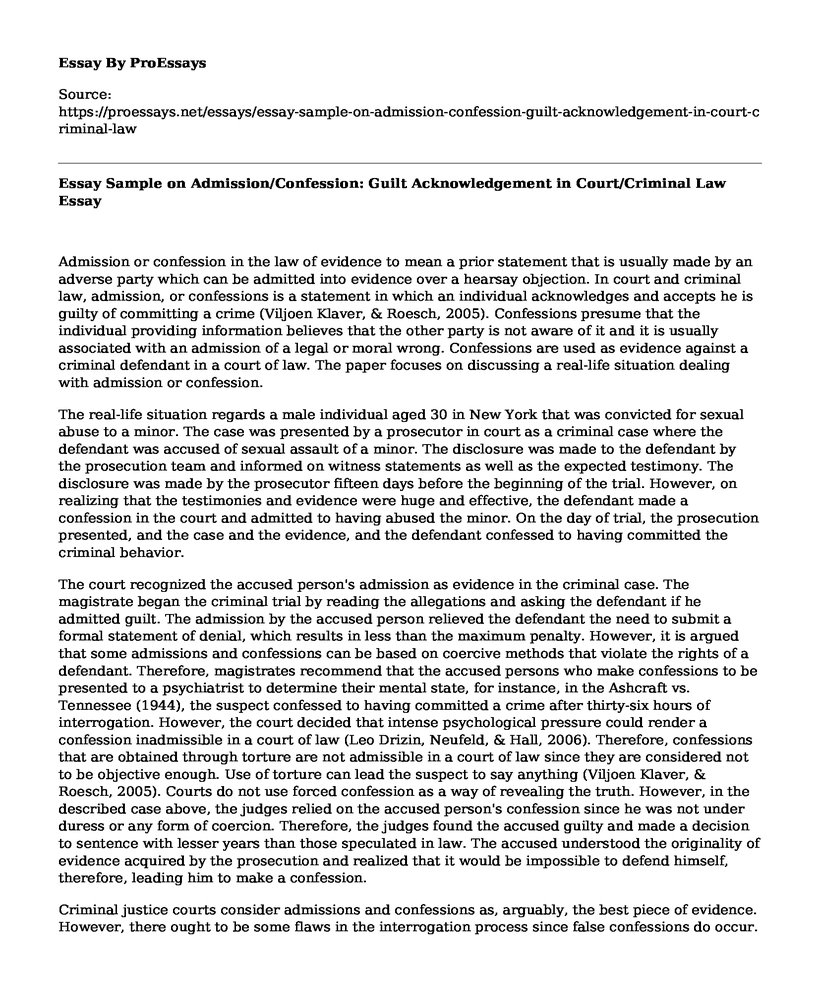Admission or confession in the law of evidence to mean a prior statement that is usually made by an adverse party which can be admitted into evidence over a hearsay objection. In court and criminal law, admission, or confessions is a statement in which an individual acknowledges and accepts he is guilty of committing a crime (Viljoen Klaver, & Roesch, 2005). Confessions presume that the individual providing information believes that the other party is not aware of it and it is usually associated with an admission of a legal or moral wrong. Confessions are used as evidence against a criminal defendant in a court of law. The paper focuses on discussing a real-life situation dealing with admission or confession.
The real-life situation regards a male individual aged 30 in New York that was convicted for sexual abuse to a minor. The case was presented by a prosecutor in court as a criminal case where the defendant was accused of sexual assault of a minor. The disclosure was made to the defendant by the prosecution team and informed on witness statements as well as the expected testimony. The disclosure was made by the prosecutor fifteen days before the beginning of the trial. However, on realizing that the testimonies and evidence were huge and effective, the defendant made a confession in the court and admitted to having abused the minor. On the day of trial, the prosecution presented, and the case and the evidence, and the defendant confessed to having committed the criminal behavior.
The court recognized the accused person's admission as evidence in the criminal case. The magistrate began the criminal trial by reading the allegations and asking the defendant if he admitted guilt. The admission by the accused person relieved the defendant the need to submit a formal statement of denial, which results in less than the maximum penalty. However, it is argued that some admissions and confessions can be based on coercive methods that violate the rights of a defendant. Therefore, magistrates recommend that the accused persons who make confessions to be presented to a psychiatrist to determine their mental state, for instance, in the Ashcraft vs. Tennessee (1944), the suspect confessed to having committed a crime after thirty-six hours of interrogation. However, the court decided that intense psychological pressure could render a confession inadmissible in a court of law (Leo Drizin, Neufeld, & Hall, 2006). Therefore, confessions that are obtained through torture are not admissible in a court of law since they are considered not to be objective enough. Use of torture can lead the suspect to say anything (Viljoen Klaver, & Roesch, 2005). Courts do not use forced confession as a way of revealing the truth. However, in the described case above, the judges relied on the accused person's confession since he was not under duress or any form of coercion. Therefore, the judges found the accused guilty and made a decision to sentence with lesser years than those speculated in law. The accused understood the originality of evidence acquired by the prosecution and realized that it would be impossible to defend himself, therefore, leading him to make a confession.
Criminal justice courts consider admissions and confessions as, arguably, the best piece of evidence. However, there ought to be some flaws in the interrogation process since false confessions do occur. Courts in the US have mechanisms that help in determining and preventing untrustworthy confessions that may lead to jeopardizing of the civil rights of a criminal defendant (Viljoen Klaver, & Roesch, 2005). Confessions play a vital role in determining the guilt or innocence of individuals accused of crimes.
References
Leo, R. A., Drizin, S. A., Neufeld, P. J., & Hall, B. R. (2006). Bringing reliability back in: False confessions and legal safeguards in the twenty-first century. Wis. L. Rev., 479.
Viljoen, J. L., Klaver, J., & Roesch, R. (2005). Legal decisions of preadolescent and adolescent defendants: Predictors of confessions, pleas, communication with attorneys, and appeals. Law and human behavior, 29(3), 253-277.
Cite this page
Essay Sample on Admission/Confession: Guilt Acknowledgement in Court/Criminal Law. (2023, Jan 31). Retrieved from https://proessays.net/essays/essay-sample-on-admission-confession-guilt-acknowledgement-in-court-criminal-law
If you are the original author of this essay and no longer wish to have it published on the ProEssays website, please click below to request its removal:
- Crime Decline Genre Analysis
- Paper Example on Truth in Sentencing (TIS)
- Sex Differences in the Structure of Deception Detection Annotated Bibliography
- Human Trafficking for Tissues, Cells, and Organs Paper Example
- Legalize Marijuana in the United States Essay Example
- Essay Sample on Net Neutrality & Criminal Justice: Examining Access to Justice in an Information World
- Essay Sample on Criminal Justice Info Literacy: Recognizing, Evaluating, Locating & Managing Sources







